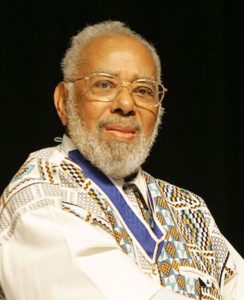
Abdias do Nascimento
*Abdias do Nascimento was born on this date in 1914. He was an Afro Brazilian writer, scholar, activist, and politician.
From São Paulo, Brazil, he was raised in a humble family; his mother, Josina, was a candy maker, and his father, Bem-Bem, was a musician and shoemaker. Nascimento joined the Brazilian Army at age 15, moving to the (then) state capital, São Paulo, where he became politically active. In the 1930s, rising nationalism, gradual industrialization, and urbanization led to political transformations in Brazil, including forming a black press and the first Afro-Brazilian organized political movement, Frente Negra Brasileira.
In 1944, after participating in the latter, Abdias founded Teatro Nacional do Negro, focusing on Black identity and heritage in Brazil, using art to promote education (through literacy classes) and to fight for social justice. The Teatro also staged poetry readings, including Langston Hughes’s Always the Same, revealing Abdias do Nascimento’s cosmopolitanism.
Despite many problems, including internal divisions, lack of funds, and support in general, the Teatro survived until 1968, when increased censorship after the 1964 military coup made it impossible to operate, and Abdias do Nascimento went into self-exile in the United States and Europe. In 1970, Nascimento became a full Professor at the State University of New York, Buffalo, founding the Chair on African Cultures in the New World at the Center for Puerto Rican Studies. He also taught in Nigeria at the University of Ife in 1976.
Returning to Brazil in the 1980s, he participated in the formation of the political party Partido Democrata Trabalhista (Democratic Labor Party). He was elected to Congress in 1983 to promote Afro-Brazilian rights.
As a senator (1991, 1996-1999), he continued this work, and in 1999, he was the first to head the recently established Rio de Janeiro Department for Citizenship and Human Rights. In 2004, he received Presidential recognition as “the greatest Brazilian political figure in the fight for Black rights and against racism, prejudice, and discrimination.”
Abdias do Nascimento saw and shaped the emergence of the modern Black movement in Brazil, and his life was wholly dedicated to racial struggle in his country. In 2004, he was nominated for the Nobel Prize for Peace. Abdias do Nascimento suffered from diabetes and died in Rio de Janeiro on May 23, 2011, due to cardiac arrest.
Kimberly Jones-de-Oliveira,
“The Politics of Culture or the Culture of Politics: Afro-Brazilian Mobilization, 1920-1968,”
Journal of Third World Studies, v. 20, part I (2003), pp. 103-120;
Elizabeth Marchant and Fernando Conceição,
“An Interview with Fernando Conceição,” Callaloo, v.25, n.2 (Spring 2002),
pp. 613-619; Abdias do Nascimento biografia.